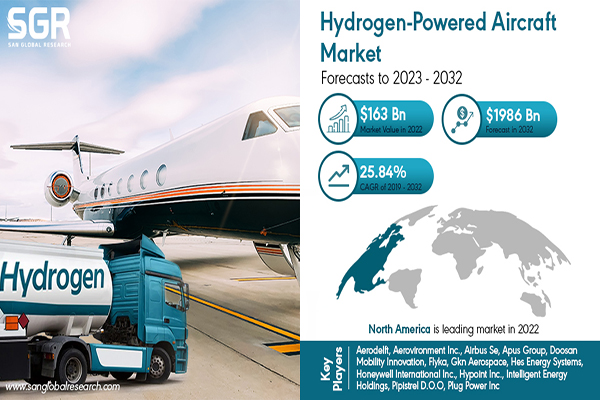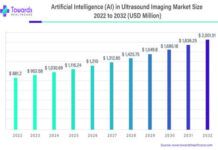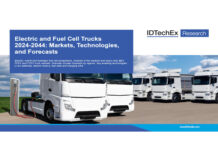According to the new report titled “Hydrogen-Powered Aircraft Market by Power Source (Hydrogen combustion, hydrogen fuel cell), By Platform (Unmanned Aerial Vehicles, Air Taxis and Business etc), By Application (Passenger aircrafts, Cargo aircrafts) – Global Analysis to 2022”, the valuation of the Hydrogen-Powered Aircraft market was $163 Billion in 2022 and is projected to reach $1986 Billion by 2032, at a CAGR of 25.84% from 2019 to 2032.
The Hydrogen-Powered Aircraft Market was valued at $163 Billion by 2022 and expected to grow at CAGR of 25.84% over forecast period. Hydrogen can be used in two primary ways in aviation: through hydrogen fuel cells or by burning hydrogen in a combustion engine. Hydrogen fuel cells produce electricity through a chemical reaction between hydrogen and oxygen, providing a clean and efficient power source. The idea behind using hydrogen as a fuel for aircraft is to reduce carbon emissions and dependence on traditional fossil fuels.
Hydrogen is considered a clean energy carrier because its combustion or use in fuel cells produces water vapor as the primary emission. Hydrogen-powered aircraft have the potential to significantly reduce greenhouse gas emissions compared to traditional jet fuels, contributing to efforts to mitigate climate change.
Rising aviation industry dominated the Hydrogen-Powered Aircraft market
The demand for hydrogen-powered aircraft in the aviation industry can be driven by several factors, reflecting both the challenges and opportunities associated with transitioning to cleaner and more sustainable aviation solutions. Growing concerns about climate change and the environmental impact of aviation have led to increased interest in sustainable aviation solutions. Hydrogen as a fuel offers a way to reduce the carbon footprint of air travel. The aviation industry is sensitive to fluctuations in fuel prices. Hydrogen, if produced cost-effectively, could provide a more stable and potentially cheaper alternative to traditional aviation fuels. As technology advances and the efficiency of hydrogen-powered aircraft improves, airlines may be more inclined to invest in these technologies. Advancements in fuel cell technology and hydrogen storage systems can make these aircraft more practical and attractive.
Hydrogen combustion held the largest share in the Hydrogen-Powered Aircraft market
Based on Station Size, the Hydrogen-Powered Aircraft Market is segmented into Hydrogen combustion, hydrogen fuel cell. Hydrogen combustion refers to the process of burning hydrogen in the presence of oxygen to produce heat and water vapor. Hydrogen combustion engines are similar to traditional internal combustion engines but are adapted to burn hydrogen gas. These engines mix hydrogen with oxygen from the air and ignite the mixture to produce a high-temperature, high-pressure gas. The hydrogen combustion process involves injecting hydrogen into the combustion chamber of the engine and mixing it with air. Once ignited, the hydrogen combusts to produce water vapor and heat. Hydrogen combustion engines can offer high efficiency and performance. The absence of carbon-based emissions contributes to the overall goal of reducing the environmental impact of aviation.
North America headed the Hydrogen-Powered Aircraft market in 2022
North America is emerged as leading market for Hydrogen-Powered Aircraft Market in 2022. The aviation industry is under increasing pressure to reduce its environmental impact. Hydrogen-powered aircraft, with their potential for zero-emission flights, could be seen as a viable solution to address environmental concerns. Stringent environmental regulations and policies aimed at reducing carbon emissions in the aviation sector could drive the demand for cleaner and more sustainable technologies, such as hydrogen-powered aircraft. Collaboration between aircraft manufacturers, airlines, and energy companies to develop the necessary infrastructure for hydrogen production, storage, and distribution is crucial for the successful deployment of hydrogen-powered aircraft. Airlines and aviation companies with a focus on sustainability and corporate social responsibility may show interest in adopting hydrogen-powered aircraft to align with public expectations and reduce their carbon footprint.
Key market players operating in the market that are profiled in the report are Aerodelft, Aerovironment Inc., Airbus Se, Apus Group, Doosan Mobility Innovation, Flyka, Gkn Aerospace, Hes Energy Systems, Honeywell International Inc., Hypoint Inc., Intelligent Energy Holdings, Pipistrel D.O.O, Plug Power Inc. etc.















